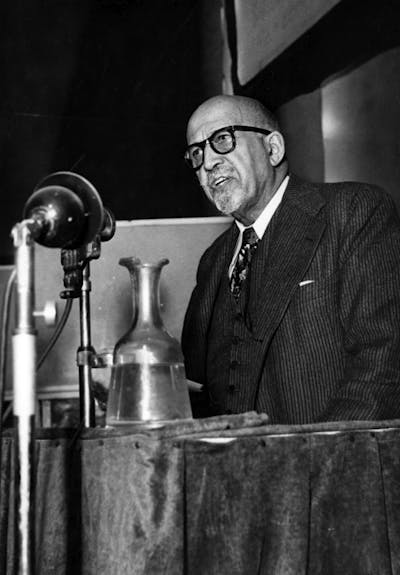
Historian Nell Painter remarked in 2011, “Being white these days isn’t what it used to be.”
For the past decade, wave upon wave of protests against police violence and mass incarceration have drawn the public’s attention toward the continued significance of America’s color line, the set of formal and informal rules that maintain white Americans’ elevated social and economic advantages.
Meanwhile, an explosion of popular literature scrutinizes those rules and places white people’s elevated status in sharp relief.
How are white people making sense of these tensions?
In his 1935 publication “Black Reconstruction in America,” sociologist W.E.B. Du Bois described the “public and psychological wage” paid to white workers in the post-Reconstruction era on account of their being white. Today those “wages of whiteness” remain durable as ever. Nearly 60 years removed from the high water mark of the Civil Rights movement, its aims have not been met.

White people still enjoy better jobs, health care, housing, schooling and more.
I’m a sociologist of race and racism. My team of graduate student researchers and I have spent the past four years interviewing white people to understand how they make sense of their white racial status today. We concentrated our efforts among white people living in the U.S. South because that region is seen as more responsible for shaping what it means to be white, and the social and economic advantages of being white, than any other.
There is not much research on how white people think about what it means to be white. Meanwhile, popular and scholarly treatments of white Southerners as overwhelmingly conservative and racially regressive abound.
Some white Southerners we spoke with fit those tropes. Many others do not. Overall, we found white Southerners across the political spectrum actively grappling with their white racial status.
As Walter, 38, from Clarksdale, Mississippi, told us, “It’s a complicated time to be a white Southerner.” We use pseudonyms to protect anonymity.
Crises cast a long shadow
The Italian political theorist Antonio Gramsci defined a crisis as a historical period in which “the old is dying and the new cannot be born.” Within this space between, Gramsci argued, “morbid phenomena of the most varied kind come to pass.”
Many people we spoke with lived through the defining ruptures of the 20th century that forever changed the South, and America too: the formal demise of Jim Crow rule, violent and bloody struggles over integration, and the slow, uneven march toward equal rights for all Americans.
Still others came of age against the backdrop of the defining shocks of this new century: 9/11 and the war on terrorism, Hurricane Katrina, the racial backlash to the election of Barack Obama, and the Black Lives Matter movement.
For some, the political rise of Donald Trump and his willingness to traffic in racist rhetoric constituted a crisis, too. “He embodies everything that is immoral,” said Ned, 45, from Vardaman, Mississippi. The town Ned is from is named for James K. Vardaman, former governor of Mississippi who once declared that “if it is necessary every Negro in the state will be lynched; it will be done to maintain white supremacy.”
Taken together, these crises cast a long shadow of uncertainty over white people’s elevated social position and anchor how white Southerners understand their white racial status.
Resistance to desegregation
Miriam, 61, from Natchez, Mississippi, grew up under the last gasps of Jim Crow. She recalled her parents pulling her from public school and sending her to a nearby private school shortly after the Supreme Court’s 1969 Alexander v. Holmes ruling, which ordered the immediate desegregation of Southern schools.
Her new school was one of hundreds of “segregation academies” founded across the South in the aftermath of the court’s ruling.
“You didn’t go over there, by the Black school,” Miriam recalled. “You stayed over by the white school. … I remember as a kid that made quite an impression.”
Reflecting on what it means to be a white Southerner today, Miriam drew from these experiences living under the region’s long shadow of segregation.
“There’s been so much hatred and so much unpleasantness. I want to do everything I can to make relations better,” she said. “I think that is part of being white in the South.”
Daryl, 42, a self-described conservative, lived in several Southern communities as a child, including Charlotte, North Carolina, in the mid-1980s as the city wrestled with its court-ordered school busing program. Daryl recalled his parents and other white people complaining about the poor quality of newly integrated schools, including telling him “stories of things like needles on the playground.”
Daryl rarely, if ever, talked with his own parents about race, but he broaches these topics with his own children today.
A self-described “childhood racist,” Daryl draws from his experiences to frame his conversations with his own children. “I remind them that there used to be this day where this was OK, and this is how things were thought of,” he says.
‘Good reason to be mad’
The region’s history also includes more contemporary crises.
Lorna, 34, is a registered Republican from Marion, Arkansas. She described how recent protests against police violence are affecting her understanding of America’s color line.
“I feel like Black people are mad or angry. They’re tired of violence and, you know, profiling,” she said. “And I don’t think it’s just in the South. I think it’s all over the United States. And they have a good reason to be mad.”
Kenneth, 35, lives in Memphis. Like Lorna and others, Kenneth’s sense of what it means to be white has been shaped by more recent crises, including the racial backlash to Obama’s elections in 2008 and 2012 that motivated Trump’s election in 2016.
Reflecting on these episodes, Kenneth believes he has an obligation as a white Southerner to become more informed about “the legacy of racism in the South and the impact that it still has today.”
Becoming more informed, Kenneth says, “will cause me to reflect on how I should think about that, and what, if anything, I should do differently now.”

Uncovering what’s minimized or ignored
Our interviews reveal a range of beliefs and attitudes among white Southerners often discounted or dismissed altogether by more popular and scholarly treatments of the region.
Contrary to research that finds white people minimizing or ignoring their elevated social status, the white Southerners we spoke with showed a profound awareness of the advantages their white racial status affords them.
“I have to admit I’m glad I’m white,” said Luke, 75, from Melber, Kentucky. “Because in the United States you probably have a little advantage.”
Our research also shows that how white people make sense of who they are is also a matter of where they are.
Places – and not just Southern ones – are imbued with ideas and beliefs that give meaning and significance to the people within them. The region’s history of racial conflict, meanwhile, renders the “wages of whiteness” more plain to see for white Southerners in ways we are only beginning to understand.
Put plainly: Place matters for how race matters.
Emphasizing this more complicated understanding of race and place allows for a more complete account of the South, including how the unfolding racial dramas of the past several decades continue to shape the region and its people.
This article is republished from The Conversation, a nonprofit, independent news organization bringing you facts and trustworthy analysis to help you make sense of our complex world. It was written by: James M. Thomas, University of Mississippi
Read more:
- After the civil rights era, white Americans failed to support systemic change to end racism. Will they now?
- Racism is such a touchy topic that many US educators avoid it – we are college professors who tackled that challenge head on
- Critical race theory: What it is and what it isn’t
James M. Thomas's research has been funded by the National Science Foundation and the Russell Sage Foundation


 The Conversation
The Conversation
 America News
America News Fox 11 Los Angeles Crime
Fox 11 Los Angeles Crime Daily Freeman
Daily Freeman Santa Maria Times Safety
Santa Maria Times Safety NOLA
NOLA Chicago Star Media
Chicago Star Media The Des Moines Register
The Des Moines Register The Westerly Sun of Westerly
The Westerly Sun of Westerly Independent Record
Independent Record New York Post
New York Post Raw Story
Raw Story